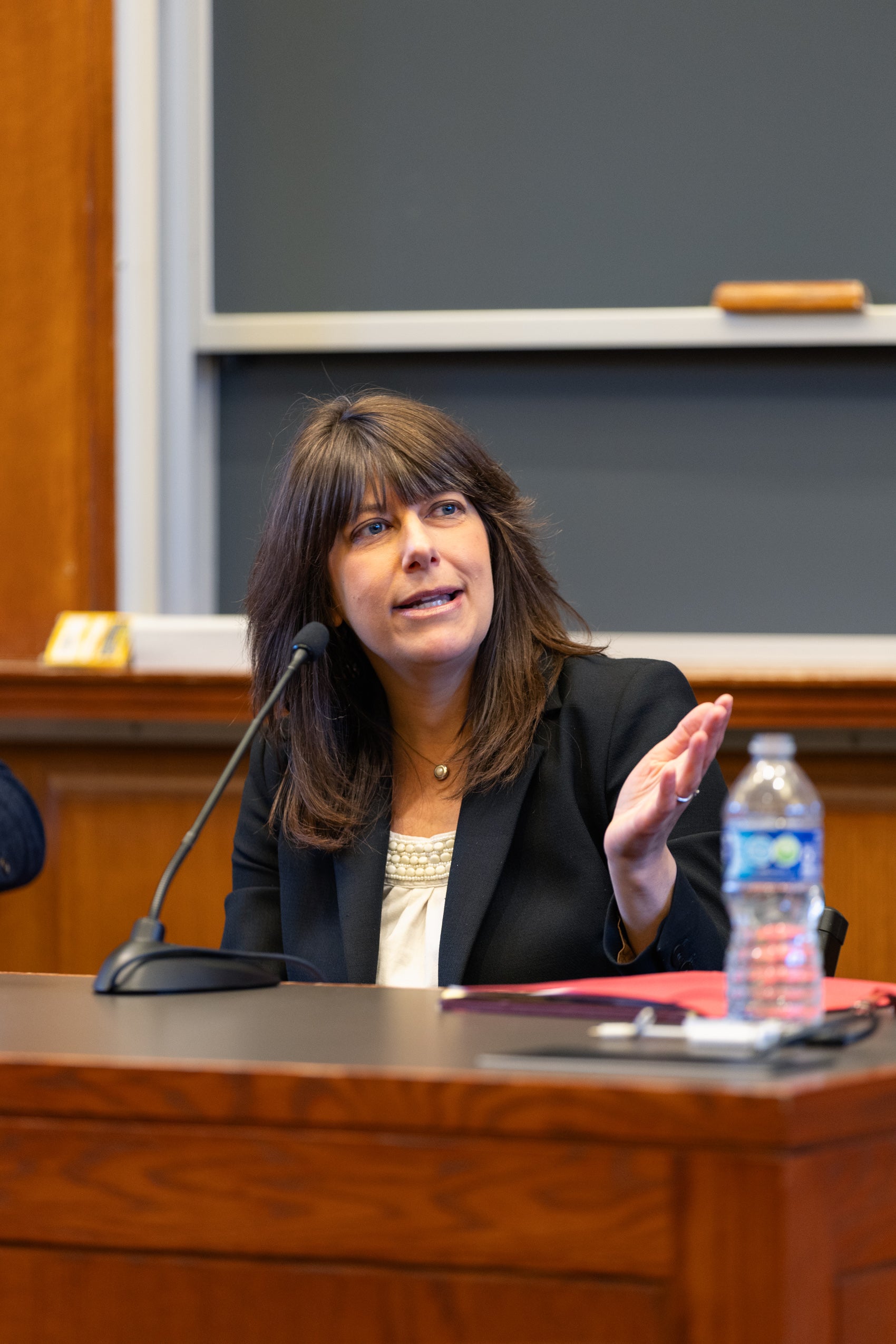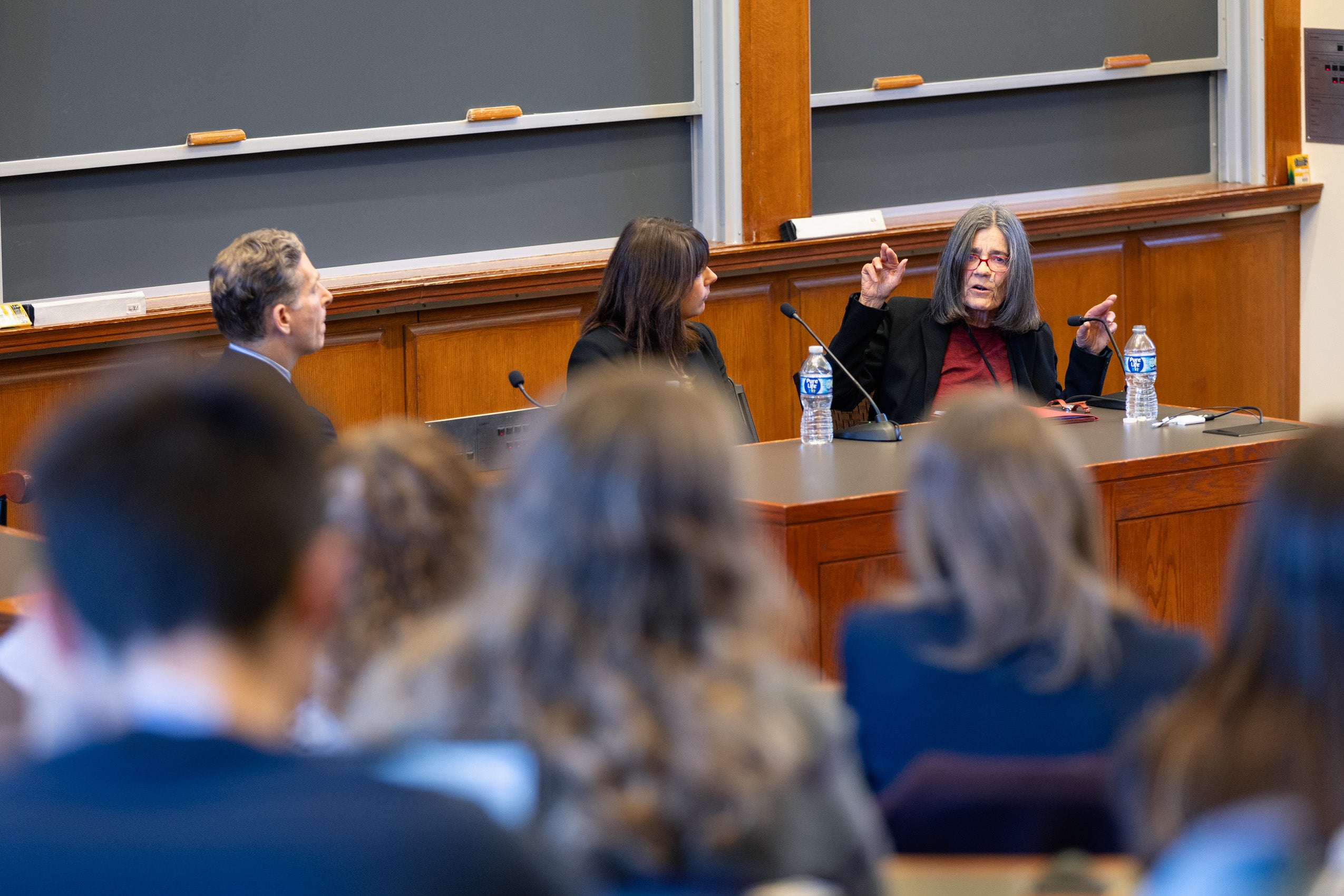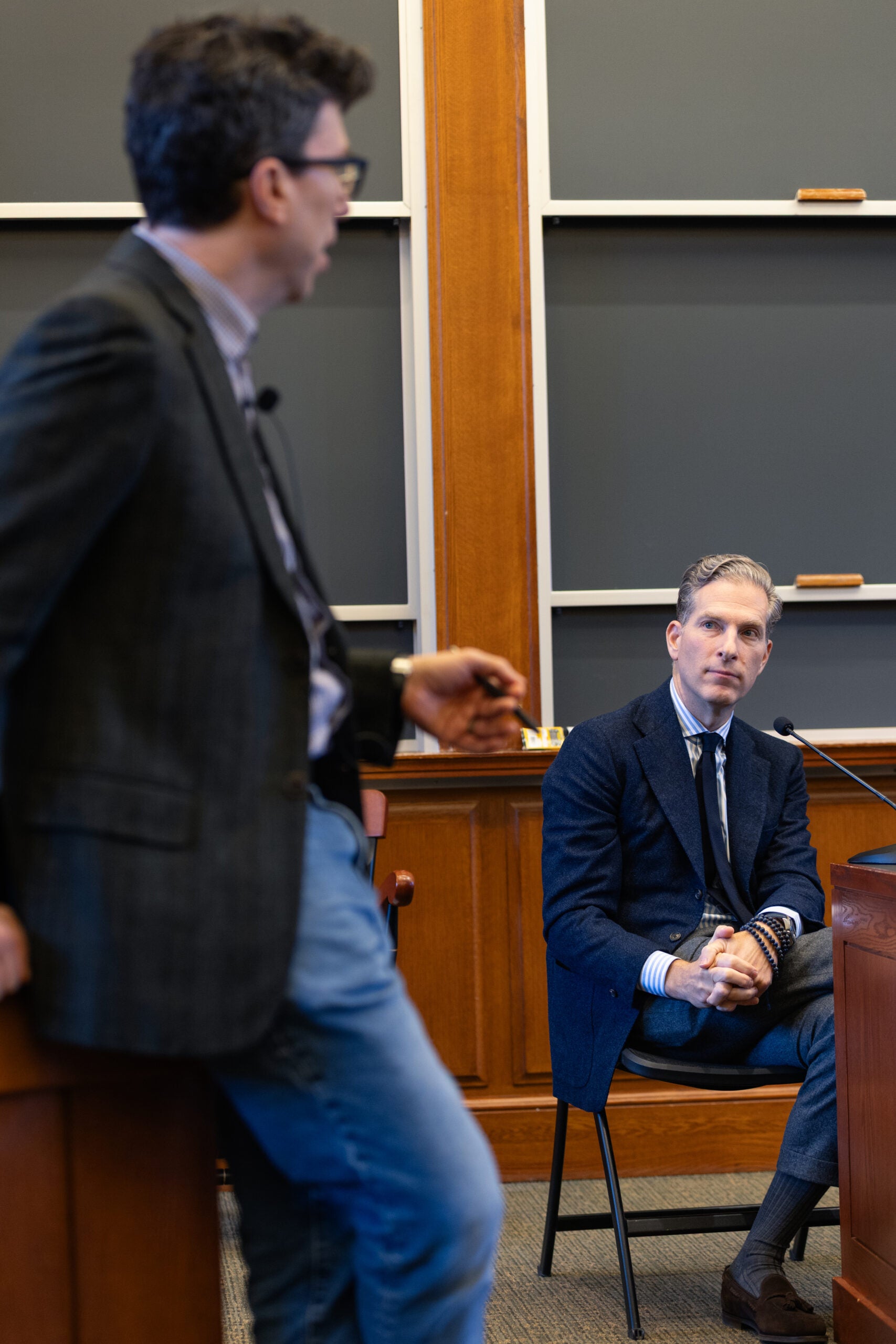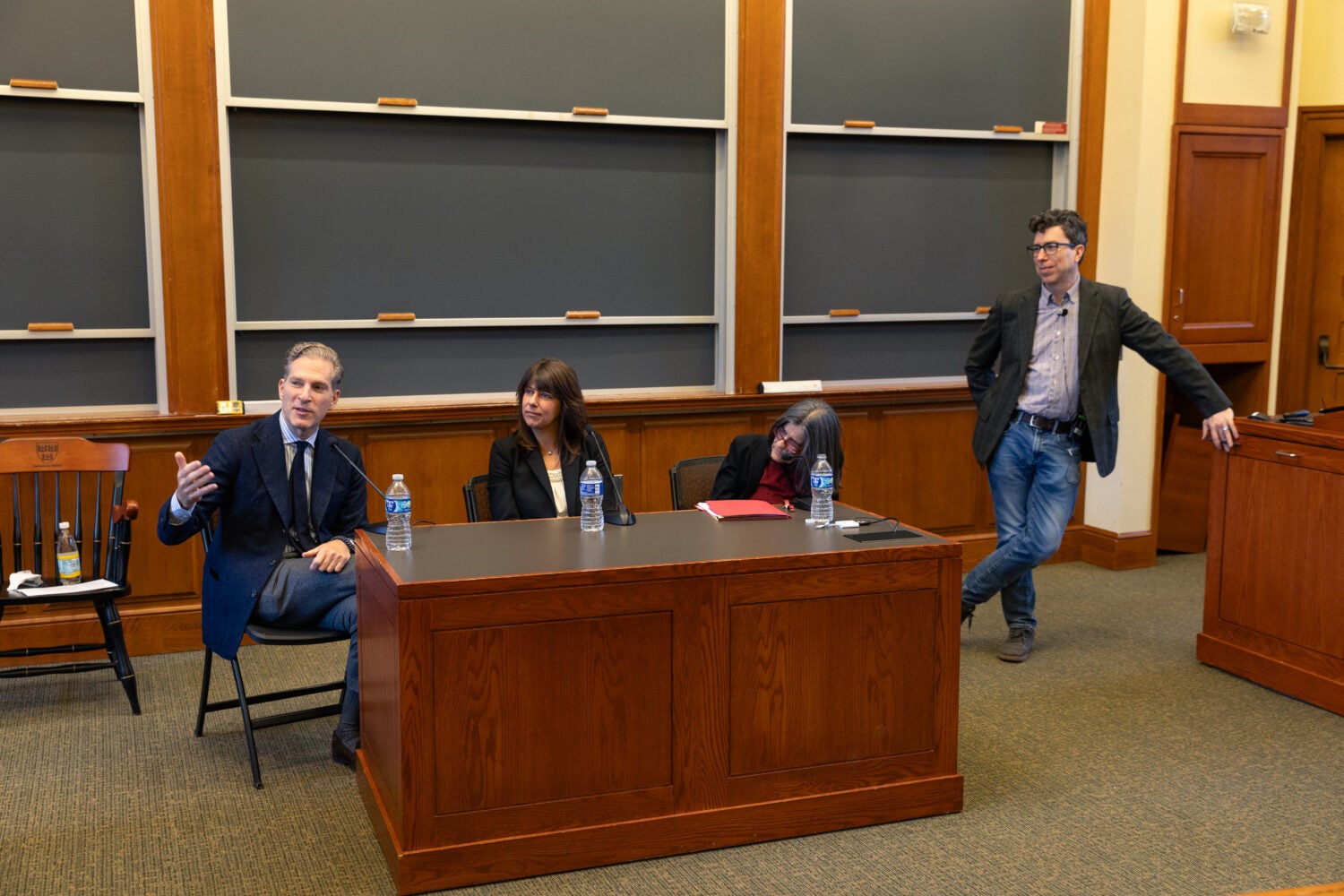As an attorney in private practice who often filed cases against states or the federal government on behalf of clients, Elizabeth Prelogar ’08 pursued and celebrated “universal remedies” in which trial court judges issue decisions that apply across the board — and the country — on a given issue or policy.
“The initial goal always was to secure relief for the client,” she said at the fourth annual Why I Changed My Mind session on April 10. “But we also very much welcomed broader relief, and that made sense to me … If the state law was unconstitutional, then there was something unjust about the state being able to go out the very next day and enforce that law against someone else.”
Then Prelogar joined the U.S. Department of Justice, where it was her job to defend the federal government, including in her most recent role as the U.S. solicitor general under President Biden.
“My thinking began to evolve,” she said. “I began to see some of the legal and practical problems that can arise from this type of universal remedy … If you are the government and you’re suddenly facing a nationwide injunction … you’ve taken an adverse decision and wildly magnified its effects … That turns into a pretty substantial intrusion on the executive branch’s province.”
Prelogar stepped down as solicitor general in January and is now the Steven and Maureen Klinsky Visiting Professor of Practice for Leadership and Progress at Harvard Law, but her consideration of universal remedies continues.
“I still haven’t made up my mind,” she said.

Prelogar’s topic was especially timely as the Republican-controlled U.S. House of Representatives earlier this month passed legislation that would bar federal trial judges from issuing nationwide injunctions.
She was one of three members of the Harvard Law faculty who candidly discussed their shifting thinking on issues at the event, which was moderated by George Bemis Professor of International Law Jonathan L. Zittrain ’95 and hosted by the Harvard Law School Library’s HLS Beyond program.
Felix Frankfurter Professor of Law Noah Feldman talked about how his views on modern legal conservatism have shifted. Louis A. Horvitz Professor of Law Lucie E. White spoke about how her years working side by side with community groups in this country and in Ghana changed her approach to advocacy.
Reflecting on Prelogar’s commentary, Zittrain offered a general takeaway for the packed audience: “It’s amazing how much where you stand depends on where you sit.”
An iterative approach to advocacy
White spent more than two decades working on social welfare issues in the U.S. before turning her attention to problems of extreme poverty in sub-Saharan Africa. In 1999, she launched Harvard Law School’s Making Rights Real: The Ghana Project Clinic through which Harvard Law students collaborate with University of Ghana School of Law faculty and students and a Ghanaian civil society organization on educational equity issues in the country’s rural north.
In the U.S., White said, she thought she was able to empower local groups to work on issues that were important to them. But in Ghana, she felt that community groups were “just fragmented with all kinds of differences” and that “there was no opportunity for people to come together to do whatever we thought we were doing in Cambridge.”

Speaking about community groups in the U.S., she said “If they didn’t get relief by storming the state house, they could always go to court.” But, even in the U.S., she went on, “I realized that I had been naïve.”
“The folks who were trying to fragment and erode the welfare state were 10 steps ahead of us, 100 steps ahead of us,” she said, and more recently “populist movements throughout the world” have “lured” community groups into actions that are “violent, xenophobic.”
“Tragically, you realize that just because a community is empowered doesn’t mean that it’s going to do things that are normatively good,” she said.
In her work today, White said, she undertakes a “deep mapping” of the “legal, political, and other social forces” at work in any given place. Interventions must be “iterative and tentative,” she said.
“Try them, step back, critique them, try something again,” she added.
‘Wishful thinking’ for the rule of law
Feldman said his perspective shift involved his thinking on modern legal conservatism, or what he calls the “Scalian Trinity,” after the late U.S. Supreme Court Justice Antonin Scalia ’60. In his view, this approach emphasizes judicial restraint, textualism, and originalism.
“As I was a law student and then a young law professor,” Feldman said, “I was not just against this point of view, but I thought this point of view was sincerely held by many people who magically always were using it to get exactly the results that they wanted … I was very troubled by the lack of restraint.”

But more recently and especially as he has studied the current U.S. Supreme Court, Feldman said he has begun — perhaps optimistically — to think he was wrong. He pointed to Associate Justice Amy Coney Barrett as an example. In Barrett’s concurring decision in New York State Rifle and Pistol Association Inc. v. Bruen, a Second Amendment case from 2022, and in cases in this term on the shadow docket, he said, “I see her trying very hard to follow rule-of-law constraining principles.”
The stakes could not be higher, Feldman said.
“You could say that the future of the rule of law in the United States right now depends on whether [Justice Barrett] and other Federalist Society-endorsed justices are true to the Federalist Society principles as the Federalist Society wrote them,” he said.
Feldman acknowledged that he may be engaged in “a little wishful thinking” that his previous view was wrong. “I really hope that I’m right that I was wrong before,” he said.
The importance of an open mind
The panelists also took questions from the audience, including about how to persuade people.
“Convincing people of something is like going shopping for clothes, not online, like IRL [in real life] shopping,” Feldman answered. “The most you can do is get people to try something on, look at themselves in the mirror and ask themselves, ‘How do I look in this?’ And if they like how they look in it, then they might buy it … You can’t force it on them.”
In times of political polarization, Feldman said later, it’s even more important to have an open mind and to recognize valid points from opposing sides.
“Maybe in an actual war where people are shooting at each other, you shouldn’t do that,” he said, “but in a war that is nominally within a democratic polity, that’s the whole point. If we’re not talking to each other, the whole thing is going to collapse.”
Want to stay up to date with Harvard Law Today? Sign up for our weekly newsletter.
